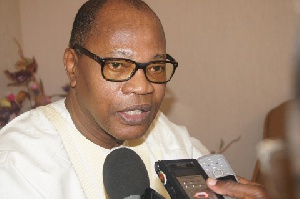The United Nations (UN) says there is the threat of terrorism on regional scale, not only the hit-and-run attacks of Boko Haram in Nigeria, Chad, Niger and Cameroon but also the wider Sahelo-Sahara region.
Dr Mohammed Ibn Chambas, the Special Representative of the UN Secretary-General for West Africa and the Sahel, said originally, militant groups were driven by sentiments of exclusion, marginalisation and disenfranchisement.
Citing Mali as a case study, he explained that it would be important to pursue efforts at decentralisation, in order to maintain a commitment by national stakeholders to the implementation of the peace process.
Dr Chambas made these remarks in Accra during the unveiling of the Head Office Complex of the West Africa Network for Peacebuilding (WANEP).
The event, which coincided with the launch of a book, dubbed: "Strides and Strains of CSOs in Africa: The WANEP Story", was chaired by Mr Alain Marcel Da Souza, the ECOWAS Commission President.
In attendance were Dr Sam G. Doe, the first Executive Director and Co-founder of WANEP and Mr Emmanuel H. Bombande, the second Executive Director and Co-founder of WANEP.
Dr Chambas said ECOWAS and WANEP would be in a good position to devise collaborative approaches in addressing these challenges and related issues of peace and security while creating a conducive environment for mediation and negotiation.
He said the ECOWAS would strengthen its collaboration with WANEP in addressing common threats affecting the sub-region.
On the recent events that led to former President Yahya Jammeh of The Gambia after more than two decades of 'strong' rule, Dr Chambas said: "While this was a truly remarkable manifestation of the international community upholding the collective will of The Gambians for genuine democracy", it will be important for civil society organisations such as WANEP to join in and support the efforts of ECOWAS, the African Union and the UN to accomplish the transition in The Gambia, which will be a long and arduous process that touches on critical issues of national reconciliation, and security sector reform”.
Mr Da Souza remarked that the wisdom of ECOWAS to formally collaborate with CSOs and in particular WANEP was in line with the ECOWAS vision of transforming itself from an ECOWAS of States to an ECOWAS of Peoples.
"Ever since the emphasis on human security became enshrined in international normative frameworks and adopted by ECOWAS as the undergirding principle for its Regional Conflict Prevention programme, the issue of peace and security can no longer be the sole preserve of governments," he said.
"Building peace and ensuring human security is the collective responsibility of all stakeholders. Governments everywhere have come to recognize and accept the critical role of civil society in complementing its efforts at building peace and sustainable development," he added.
Mr Chukwuemeka B. Eze, the Executive Director of WANEP, said with the cooporation of governments, ECOWAS, the African Union, and development partners, WANEP had continued to act as a catalyst in implementing programmes and specific activities that support Africa Peace Agenda.
General News of Saturday, 4 February 2017
Source: GNA













